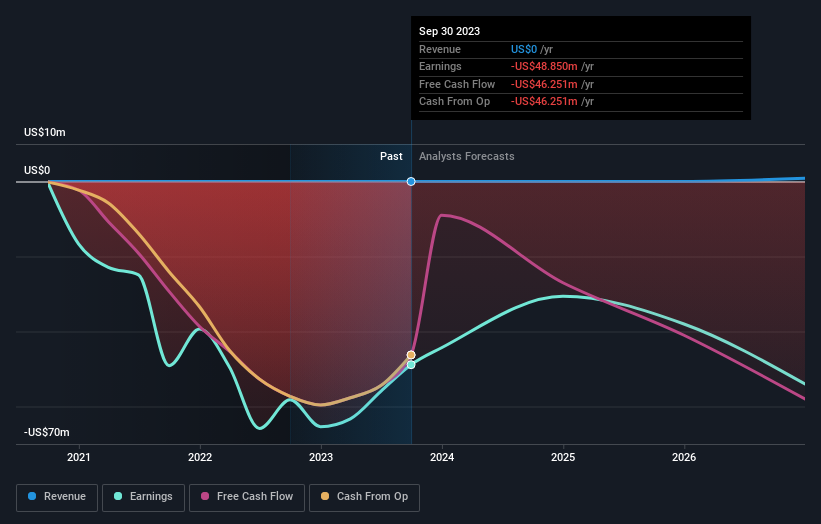Vincerx Pharma, Inc.'s (NASDAQ:VINC) large institutional owners must be happy as stock continues to impress, up 28% over the past week
Key Insights
Given the large stake in the stock by institutions, Vincerx Pharma's stock price might be vulnerable to their trading decisions
The top 9 shareholders own 50% of the company
Every investor in Vincerx Pharma, Inc. (NASDAQ:VINC) should be aware of the most powerful shareholder groups. The group holding the most number of shares in the company, around 38% to be precise, is institutions. Put another way, the group faces the maximum upside potential (or downside risk).
Last week’s 28% gain means that institutional investors were on the positive end of the spectrum even as the company has shown strong longer-term trends. One-year return to shareholders is currently 347% and last week’s gain was the icing on the cake.
In the chart below, we zoom in on the different ownership groups of Vincerx Pharma.
View our latest analysis for Vincerx Pharma
What Does The Institutional Ownership Tell Us About Vincerx Pharma?
Institutional investors commonly compare their own returns to the returns of a commonly followed index. So they generally do consider buying larger companies that are included in the relevant benchmark index.
Vincerx Pharma already has institutions on the share registry. Indeed, they own a respectable stake in the company. This implies the analysts working for those institutions have looked at the stock and they like it. But just like anyone else, they could be wrong. It is not uncommon to see a big share price drop if two large institutional investors try to sell out of a stock at the same time. So it is worth checking the past earnings trajectory of Vincerx Pharma, (below). Of course, keep in mind that there are other factors to consider, too.
We note that hedge funds don't have a meaningful investment in Vincerx Pharma. The company's CEO Ahmed Hamdy is the largest shareholder with 8.0% of shares outstanding. The second and third largest shareholders are Goldman Sachs & Co. LLC and Sage Rhino Capital, LLC, with an equal amount of shares to their name at 8.0%.
We did some more digging and found that 9 of the top shareholders account for roughly 50% of the register, implying that along with larger shareholders, there are a few smaller shareholders, thereby balancing out each others interests somewhat.
While it makes sense to study institutional ownership data for a company, it also makes sense to study analyst sentiments to know which way the wind is blowing. There are a reasonable number of analysts covering the stock, so it might be useful to find out their aggregate view on the future.
Insider Ownership Of Vincerx Pharma
The definition of an insider can differ slightly between different countries, but members of the board of directors always count. Company management run the business, but the CEO will answer to the board, even if he or she is a member of it.
Most consider insider ownership a positive because it can indicate the board is well aligned with other shareholders. However, on some occasions too much power is concentrated within this group.
Our most recent data indicates that insiders own a reasonable proportion of Vincerx Pharma, Inc.. It has a market capitalization of just US$111m, and insiders have US$20m worth of shares in their own names. This may suggest that the founders still own a lot of shares. You can click here to see if they have been buying or selling.
General Public Ownership
With a 36% ownership, the general public, mostly comprising of individual investors, have some degree of sway over Vincerx Pharma. While this group can't necessarily call the shots, it can certainly have a real influence on how the company is run.
Private Company Ownership
Our data indicates that Private Companies hold 8.0%, of the company's shares. It might be worth looking deeper into this. If related parties, such as insiders, have an interest in one of these private companies, that should be disclosed in the annual report. Private companies may also have a strategic interest in the company.
Next Steps:
I find it very interesting to look at who exactly owns a company. But to truly gain insight, we need to consider other information, too. For example, we've discovered 5 warning signs for Vincerx Pharma (4 make us uncomfortable!) that you should be aware of before investing here.
If you are like me, you may want to think about whether this company will grow or shrink. Luckily, you can check this free report showing analyst forecasts for its future.
NB: Figures in this article are calculated using data from the last twelve months, which refer to the 12-month period ending on the last date of the month the financial statement is dated. This may not be consistent with full year annual report figures.
Have feedback on this article? Concerned about the content? Get in touch with us directly. Alternatively, email editorial-team (at) simplywallst.com.
This article by Simply Wall St is general in nature. We provide commentary based on historical data and analyst forecasts only using an unbiased methodology and our articles are not intended to be financial advice. It does not constitute a recommendation to buy or sell any stock, and does not take account of your objectives, or your financial situation. We aim to bring you long-term focused analysis driven by fundamental data. Note that our analysis may not factor in the latest price-sensitive company announcements or qualitative material. Simply Wall St has no position in any stocks mentioned.


